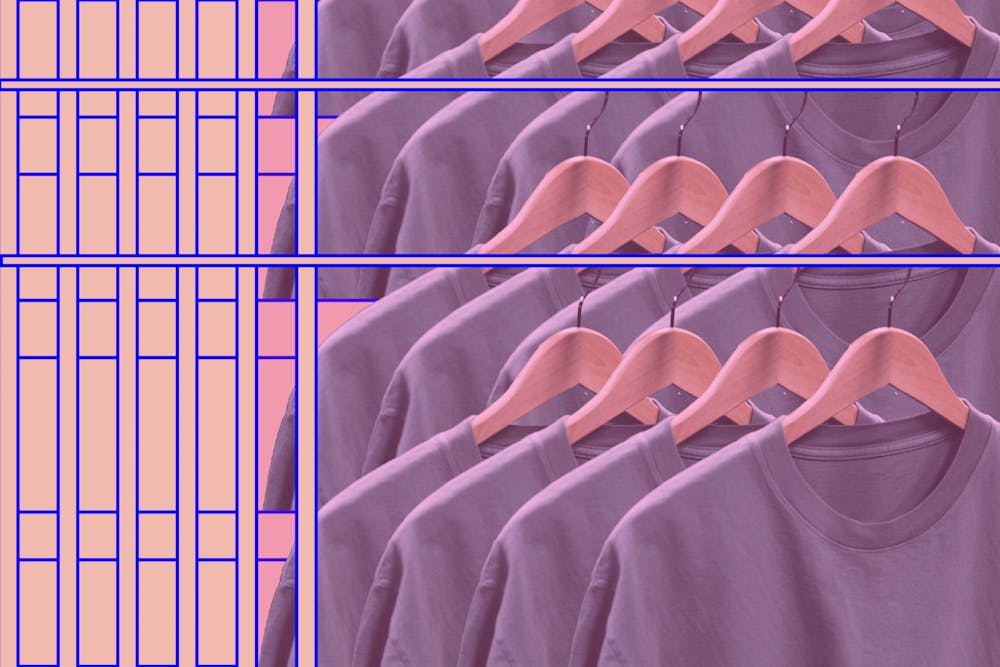As vintage Nike crewnecks and Champion joggers become essential components of the drip, thrift shopping— or thrifting—to find classic gems has become a favorite pastime of the American millennial and teen. The pleasure of finding affordable and fashionable gems at thrift stores is a joy many of us can relate to, but not everyone views thrifting as a fun shopping trip with friends. Some "industrious" people see thrifting as a potential business to make big profits.
Price gouging second–hand clothes isn’t a new phenomenon. In the early 2000s, thrifters and retailers marked up vintage sportswear brands such as Nike and Champion to signal that these brands were the next fashion trend. Thanks to Depop, this practice has evolved. Depop is a popular online thrift store platform, known for its edgy, trendy vibe and a large selection of vintage clothes, accessories, and shoes for all types of styles. Self–described as “the fashion marketplace app where the next generation comes to discover unique items," Depop claims "this is what transforming fashion looks like.” However, whether or not the sellers of this app adhere to Depop’s mission statement is up for debate.
Recently, many Depop sellers have come under fire for a pattern of unethical buying and selling practices. Sellers who appear to be wealthier individuals are being accused of raiding thrift stores to buy tons of product for a cheap price and re–selling on the platform for a signifigant mark–up. Sellers buy entire racks of children’s clothes, label them as “tweety bird vintage, Y2K style, XS crop top”, and then sell them for sixty to seventy dollars. TikTok stars exposed these unethical practices by screenshooting Depop shops with ridiculous prices for clearly basic clothes. The sellers were mocked, and TikTok users encouraged people to spam the seller’s page with comments. Eventually, these scammers either eventually leave the platform or lower their prices.
Although it’s easy to write off these practices as just blatant capitalistic greed, there's more to this issue than that. Depop practices are indicative of a long–term problem that we can denote as the gentrification of fashion. The gentrification of fashion occurs when original trends started by primarily Black, low–income people are coopted into mainstream fashion—but without the credit and praise.
So, how does re–selling fit into this process of gentrification?
Reselling vintage and second–hand clothing, while not inherently classist, can lead to classist rhetoric amid interactions between wealthy and low–income people. When wealthy people gentrify fashion, they are able to claim a moral high ground that allows them to shirk the blame of climate change and capitalism. And after praising themselves for their fashionable, ethical lifestyle, they turn around and point the finger at low–income people who shop fast fashion, or cheap clothing made at super speed and sold in department stores for the span of a trend cycle.
Wealthy sellers on Depop participate in this rhetoric of shaming and mockery and do so without realizing it. The original trendsetters of grunge, indie, and other vintage styles were low–income people who wore second–hand clothes when it was shameful and uncool, and when thrift stores were embarrassing simply because they were frequented by the poor. So, while shopping vintage isn’t inherently part of the gentrification of fashion and its classist implications, those who participate in the trend and simultaneously degrade people for shopping fast fashion are.
Even if some Depop sellers want to claim that re–selling and overpricing is still a net good because it helps more people get access to second–hand clothing, shifting from one unethical mode of consumerism to another one is still counterproductive. Yes, we should all try to do what we can to reduce the impacts of fast fashion and clothing waste. But we must do so without propagating harmful classist ideas. Depop sellers should stop price–gouging people who just want to look cute in some vintage styles, and wealthy people shouldn’t shame low–income people for wanting to own something of their very own. After all, everyone has a right to the drip.

